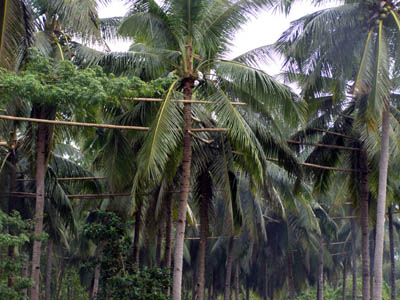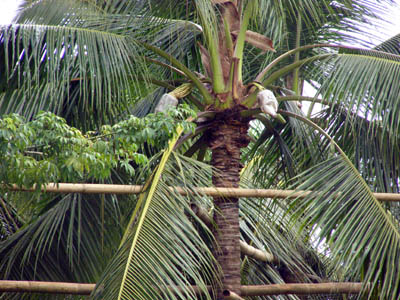|
Tuba or Palm Wine
Tuba or palm wine, one of Batangas small-scale industry that caught my attention when I visited the town of San Juan. The province by the way has adequate coconut trees making it as one of the top coconut producer in the Philippines.
I happen to taste tuba, in Laiya when I met a local who offered me to try the liquor. At first I was hesitant to try. But as Rey, a local villager continued persuading me to have a shot! I cannot do anything but to try it. As I tried a half filled glass of tuba, it turned out that it was not that strong which I have on mind. The taste was a bit sour, sweet and scrumptious with just a dash of alcohol. Rey was laughing when I mentioned that it was not that strong. He told me “there are two alcoholic beverages made from coconut, and the strong one is the lambanog (alcoholic beverage or coconut vodka)”. Tuba when distilled produces a stronger drink called lambanog. The second reason why it is not that strong, the tuba that I drank was still fresh, less than a day old. As the day passes it begins to ferment and alcohol content increases. Tuba is at its finest during the first day, up to the third day when it was initially gathered. Usually after the fifth day, bacteria steps in and the tuba turns into vinegar. A good thing about tuba, it is produced in a natural process, and thus it’s chemical free. The process of collecting tuba from the coconut tree is dangerous and time consuming. To extract tuba, one has to climb a coconut tree. Then, the tuba gatherer has to cut the tip of the closed part of the coconut flower. Next, the coconut sap will drip liquid drops on a bamboo tube to collect the juice from its cut end.
Foliage is tied at the bamboo tube to prevent other particles to adulterate it from other substance like rainwater. The tuba gatherer must ascend the tree every 12 hours to remove extra slice from the stem. If you don’t do it regularly, the wound will be cured, and liquid sap will stop flowing. A coconut tree normally produces a gallon of tuba per day. But that also depend on the tree and other environmental factors, which may increase or decrease the production.
And lately, according to another villager Mang Tonyo a new discovery to “extricate sugar from tuba was uncovered”. The coconut sugar was established to have a healthy form that will benefit individuals with high blood sugar. The coco-sugar is produce by boiling the sap. When the liquid starts to thicken it is removed from the heat. The thick fluid will then finally break down into grainy form, which then becomes the coco-sugar. I’ve learned a lot about the coconut tree and the tuba we shared during a simple gathering among the locals of Laiya. It was a nice experience and met new friends. If anybody from the village offers you a tuba drink or palm wine. Try it! It is a refreshing beverage that I’m sure you will like, and feel the warm hospitality of Filipinos.
Return from Palm Wine to About Batangas
|







